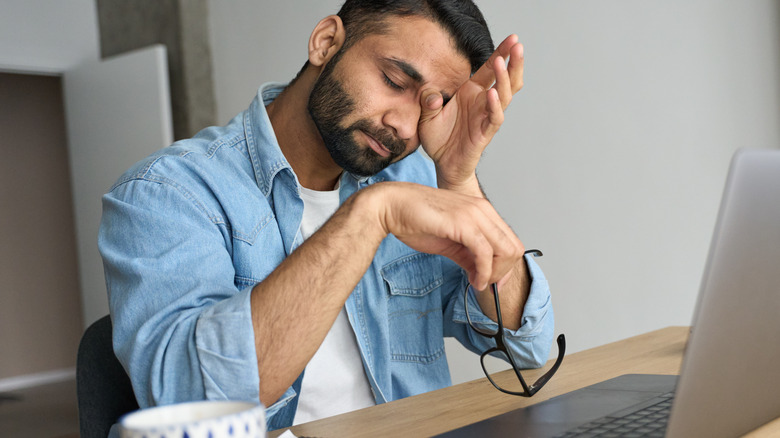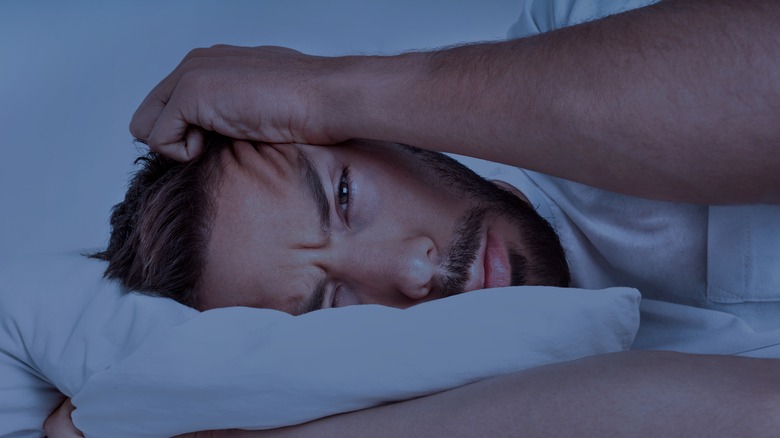Fatigue Explained: Causes, Symptoms, And Treatments
How are your energy levels these days? A little low? This is certainly not uncommon! We all feel tired sometimes, especially at the end of a long and busy day. But feeling fatigue on a more consistent basis (sometimes daily) can be quite a burden — and may be indicative of other problems.
When fatigue begins to encroach on your everyday activities, causing you to say no to experiences or opportunities you might otherwise take in favor of extra rest, it may be time to think about fatigue and its role in your life on a deeper level. In most cases, excluding diagnoses such as chronic fatigue syndrome, fatigue is more likely a symptom rather than a condition itself (via Better Health Channel). In these cases, it may be worth it to imagine some of the most common causes of life-impacting fatigue.
The causes of daily fatigue range from minor to more serious, but in most cases, there are many small tweaks you can try that will improve your daily energy levels over time. Read on to learn more.
What's the difference between feeling tired and being fatigued?
Before reading about some of the potential causes of fatigue, it's helpful to get the full picture of what fatigue really feels like.
Again, we can all feel tired after a restless night of sleep or while recovering from an illness or late night out. However, fatigue is a bit different in that it's usually persistent and without an obvious trigger. WebMD explains fatigue as "a lingering tiredness that is constant and limiting. With fatigue, you have unexplained, persistent, and relapsing exhaustion. It's similar to how you feel when you have the flu or have missed a lot of sleep." With fatigue, this feeling will last many days, weeks, months, or even years. After a full 8 to 9 hours of sleep, you may wake up feeling tired (sometimes even after coffee, even!).
Fatigue also interferes with your life and work; you may feel too tired to get through projects or manage your daily life responsibilities. Again, it's common to feel this way from time to time, but if you feel this way every day, then you're probably looking at more of a chronic fatigue situation than an occasional bout of being tired. If this is your situation and you'd like more energy to accomplish your goals, think about some of its potential causes, as well as some things you can try to help reduce or remedy that pesky fatigue feeling.
Lack of physical activity can make you fatigued
While it seems counterintuitive, it's often a lack of activity that makes us feel more fatigued than usual. Exercise, or even just the avoidance of sedentary lifestyles, can help boost our energy in the long run, as movement can release endorphin chemicals into our bloodstream, triggering positive emotions, and, often, energy.
According to Healthline, "studies show that exercising more may improve symptoms of fatigue in some people." This is why incorporating daily exercise (even if just in the form of a 15-minute walk) can build your energy throughout the day, as time goes by. It's also why incorporating movement into your workday can be beneficial, and it's why you've seen many looking for ways to practice more active work positions (think standing desks) throughout the day.
When you're fatigued, though, the thought of exercise can be overwhelming or seem downright impossible. Try to start small and not put too much pressure on yourself — trying to immediately get 10,000 steps in a day to cure your fatigue is not recommended. Instead, consider starting with even just a 5-minute walk before you eat lunch, or doing just 10 jumping jacks in a day. Over time, you can build up and do more, but the idea here is just to start moving more.
On the contrary, too much exercise can cause fatigue
A double-edged sword concept applies when it comes to exercise and fatigue. It's certainly possible that physical exertion or overdoing exercise can cause fatigue in the long run (via Healthline). If you don't find the right balance of exercise in tandem with all of your other daily life tasks and responsibilities, you could be at risk of causing excess tiredness.
Another thing to keep in mind: Sometimes, people have to "fit" exercise in at odd times throughout the day, waking up much earlier to staying up later to squeeze in exercise time. This may cause their sleep balance to be thrown off, or may take away from needed hours of sleep. All of this is why smaller steps are generally encouraged if you're trying to incorporate more exercise into your life — and why you might try to get exercise in throughout your day rather than at off-hours.
Excess mental or emotional stress can cause fatigue to set in
We've all been experiencing a lot of extra stress over the past two-plus years, with a global pandemic still impacting our lives and all. That experience by itself may be impacting your overall energy levels. If you add in any extra stressors you might be feeling — whether it's work, relationships, health, or anything, really — your brain might be in a constant state of stress, making you feel run-down throughout the day, even if you've had plenty of sleep. The Mayo Clinic lists anxiety, depression, brief, and stress as causes of excess fatigue. Collectively, we may be feeling all or some of these emotions.
Just like exercise, it's important to try small steps to manage your mental and emotional health. If you haven't already considered interventions such as talk therapy or meditation, now be the time to start. Also, consider cutting back on screen time and news consumption: all of these can contribute to a sense of stress over time (via Psychology Today). As is the case with exercise, try not to be too hard on yourself if you're in a time of excess mental or emotional stress, as this can only cause a loop of further emotional burden and fatigue: try to work on the root causes of the stress, allowing yourself to know that your energy may begin to lift after you've improved or eliminated that root cause.
Your meds may be contributing to your fatigue
If you've started a new medication recently, be sure to check the full packet to see if it lists fatigue as a possible side effect. Certain medications – including pain medications, health medications, antidepressants, and radiation therapy — can cause excess fatigue (via the Mayo Clinic). Of course, if you need these medications, fatigue may be something that you'll have to factor in.
However, as WebMD notes, some side effects balance out over an extended period of time as your body gets used to a new medication, so give it some time before you try to switch to something else. If you've been on medication for a long period of time and have had fatigue for a correspondingly long time, however, it might be worth doing some research to determine if that may be a potential cause. In that case, talk to your doctor to see if there are alternatives. Sometimes, a lower dose might be a possible course of action. Or if it's been years, perhaps new options have come on to the market that you might try. That said, don't stop taking needed medication without having these conversations first.
You may have undiagnosed food allergies
A less common, but nonetheless very legitimate, cause of lingering fatigue can be food allergies (via OnHealth). While not all allergies are enough to cause you to break out into hives, you could potentially have minor allergies to foods and ingredients you consume on a regular basis, thus dragging your body into a constant state of intolerance and resulting in fatigue as your body struggles to balance itself.
If you eat some types of food pretty consistently (think grains or bread, perhaps), it might be worth removing that from your diet for a week or more to see if you feel any difference in your energy levels. If you want to really step up this part of the investigation, you could consider allergy testing in consultation with a medical professional. In any case, many have found some relief after discovering that their bodies are actually intolerant of certain foods they may have been consuming daily before (via the University of York).
Try easing up on the caffeine if you're feeling fatigued every day
In what may seem like a bit of a paradox, caffeine, if overused, can actually contribute to fatigue.
While coffee, tea, and energy drinks can all give you a much-needed boost throughout the day, if you consume too much or drink them at times that may disrupt your body's natural rhythms and/or sleep cycles, energy crashes or imbalances can leave you feeling seriously tired on the daily. As your body comes down off caffeine, you can experience rebound fatigue (via Healthline). For some, this leads to another coffee, which then boosts alertness for a short while, but can contribute to insomnia or sleep disturbances. In other words, this is not a great cycle.
Try cutting back on caffeine or avoiding it after a certain time to see if it helps with afternoon fatigue. You may also try options with lower caffeine levels to help avoid energy "bursts" that may lead to energy downbursts later on. Try green or black tea if you're a coffee drinker, or mix your regular coffee grounds with part-decaf. You'll likely need some time to get used to this technique, though: If you're a huge coffee drinker and cut back, you are probably going to feel even more fatigue for a brief period of time (via the Cleveland Clinic).
Are you eating consistently (and often enough)?
In our uber-busy lives, it can be easy to skimp on meals, opting for a cup of coffee and a granola bar for breakfast or picking at a meal during dinner while you tend to others in your household. It's also easy to eat at inconsistent times, somedays eating dinner at 5 p.m., while on other days eating at 9 p.m. Our bodies do crave consistency, though, and it's been found that you can potentially achieve higher levels of energy throughout the day if the body knows what to expect — and when to expect it — in terms of replenishing its blood sugar levels with a balanced and healthy meal.
If you're feeling a lot of fatigue lately, it may be worth trying to eat on a more consistent schedule (via the Center for Healthy Eating and Activity Research). With that, try to eat balanced, hearty, healthy meals throughout the day (with an occasional cheat thrown in, of course). While eating on a schedule can be challenging, consider the potential rewards: you may have more energy to be there and fully show up for your work, personal, and family obligations. Making time to feed and replenish yourself is only going to improve your life — and the lives of those around you — so making time for yourself to eat full and consistent meals each and every day is really a basic necessity. Try it!
You might be deficient in some nutrients or vitamins
Sometimes, fatigue can set in if you're consistently low on any number of nutrients or vitamins. For example, anemia can cause fatigue, and one cause of anemia could be iron deficiency (via WebMD).
Other common deficiencies linked with fatigue include vitamin B12, vitamin D, magnesium, potassium, and omega-3 vitamins. Dr. Amy Myers (via MOXIE Lifestyle) suggests that you try upping your intake of certain foods to help remedy fatigue. For B vitamins, this includes root vegetables, leafy greens, shellfish, and grass-fed or pasture-raised meat. If you need more magnesium, incorporate fish, seaweed, dark leafy greens, figs, bananas, and avocados into your diet. For your vitamin D needs, try consuming more spirulina, fatty fish, organ meats, wild mushrooms, and bee pollen. If it's omega-3 you need, grass-fed meats, flax and chia oil, and fatty fish are good options. Finally, for potassium, try apricots, bananas, cooked spinach, cucumber, oranges, and sweet potatoes.
It might also help to ask your doctor to do some blood tests checking your levels of these essential vitamin types, as well as a general blood panel if you haven't had one in a while. The fix for your fatigue woes may be as simple as eating more of certain types of foods or adding in a supplement to your daily routine.
Maybe you just need more sleep!
Do you find yourself "oversleeping" or "sleeping in" on weekends? Do you feel a little more refreshed after getting, say, 10 hours of sleep instead of 8?
If you've eliminated most of the primary causes of fatigue and are at a loss, sometimes the simplest answer can be key. Many of us get into sleep routines and think our body only really needs the amount of sleep we give it, sticking to 7 or 8 hours because that's what we've been told is ideal for most people. However, it's possible that your unique body just needs more sleep (via the Sleep Foundation).
Carving out time in your weekdays to go to sleep 1 to 2 hours earlier is something you might want to consider. Another option is to find a way to start your weekdays a couple hours later. While this requires more coordination if you have kids and/or a job, it can be worth trying to emulate your "weekend" sleep schedule if that leaves your body feeling more refreshed. Ultimately, if it will improve your quality of life, it certainly deserves a shot!
Take a deeper look at your relaxation and pre-bedtime routines
As part of your quest to reduce fatigue, it may be worth examining your relaxation and sleep methods. This goes beyond simply adding in more sleep. You may want to delve deep into how much relaxation time you give yourself before sleep, as in: Are you scrolling through your phone moments before drifting off to sleep? Do you sleep to the sound of a blaring Netflix show? Do you routinely have a glass of wine before bed? How soon before sleep are you eating?
Every person is different, but it is generally known that active relaxation throughout the day — and before sleep — can help with your overall energy levels and sleep quality (via The Sleep Foundation). Examining the state your body is in before it drifts to sleep may be key in the overall impact of that rest, so try a few nights of a more relaxed bedtime route. Techniques might include being sure to not eat or drink anything (other than water) at least two hours before you go to sleep, reading a book instead of looking at screens before rest, and practicing some form of active relaxation (mindfulness, journaling, gratitude, affirmations, meditation are all examples) as part of your evening routine. While it can take some time to strike the perfect balance, you may find that small tweaks improve your overall sleep, and you may feel more rejuvenated in the mornings and throughout your day.
Are you dehydrated?
One of the most common causes of fatigue is dehydration. Remember, your body needs regular fluids — especially water — to perform its most important tasks. Leaving your body constantly dehydrated is like expecting your car to keep running on low fuel. If your urine does not run clear or pale yellow, it's likely you're dehydrated (via OnHealth).
How much do you need? The ideal, according to the U.S. National Academies of Sciences, Engineering, and Medicine (as cited by the Mayo Clinic), is "about 15.5 cups (3.7 liters) of fluids a day for men and about 11.5 cups (2.7 liters) of fluids a day for women." These amounts may need to be altered, too, if you're in a hotter climate, exercising a lot, or recovering from infections.
The good news is you can work on hydration levels with a variety of drinks, including herbal teas, juices, and milks. The key is to avoid anything loaded with sugar, though (or at least drink them sparingly).
Be sure to partner with your doctor and ask for advice as you make changes
As with any other health concerns — especially those that linger — it's important to remember the role a qualified medical health professional can and should have in your quest to improve the situation.
Don't try switching medications, changing your entire sleep or workout routine, or anything major without, at the very least, a discussion with your provider (via Medical News Today). The possible causes are many, and any number of factors in a given day can result in a day of more or less energy. It's a good idea to examine them in consultation with your doctor.
Finding the root cause (or sometimes, root causes) of your lingering fatigue can feel a little bit like detective work. Still, when you can reduce persistent fatigue, you can experience a better quality of life in the long run. Thus, in this case, it's certainly worth the investigation.














